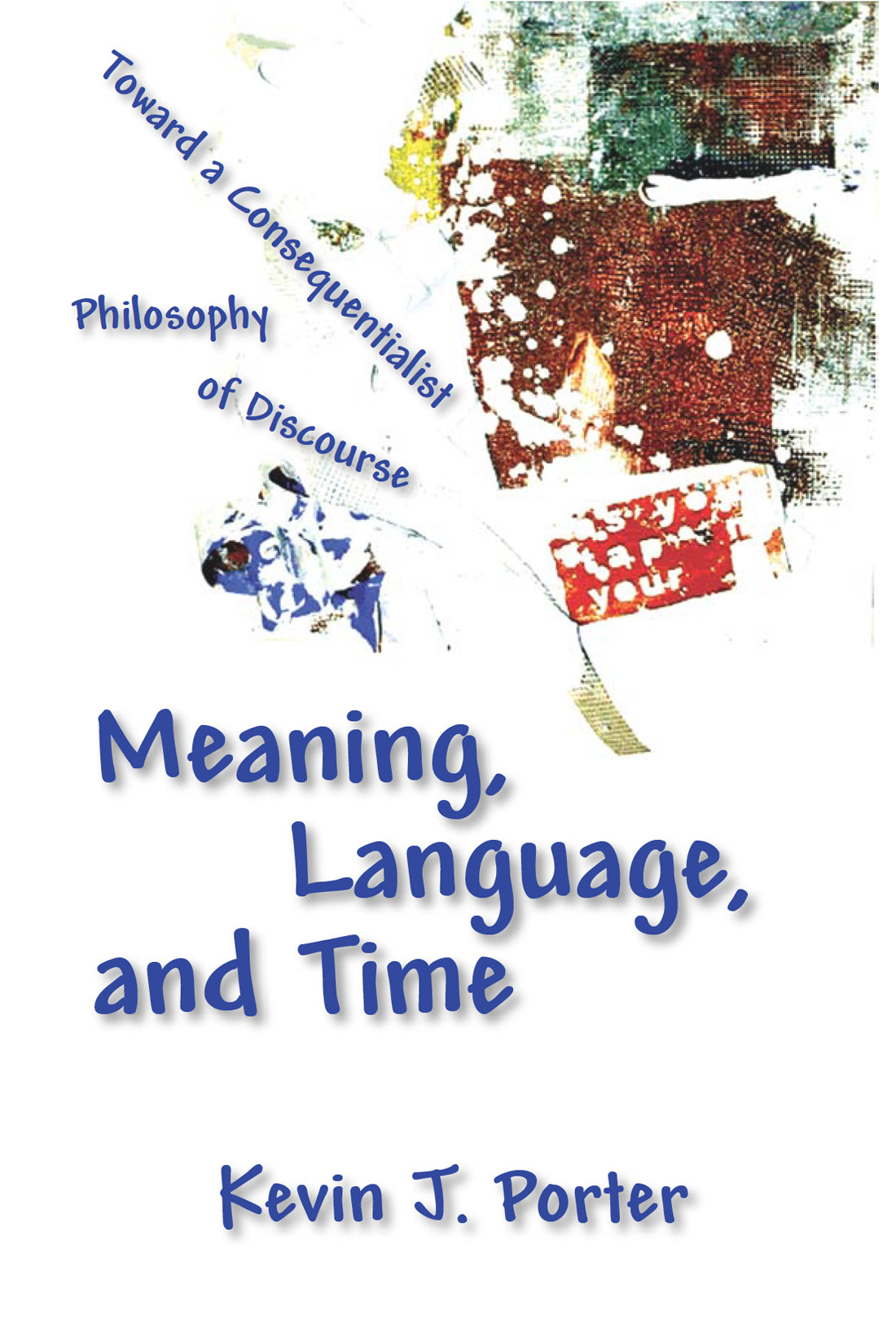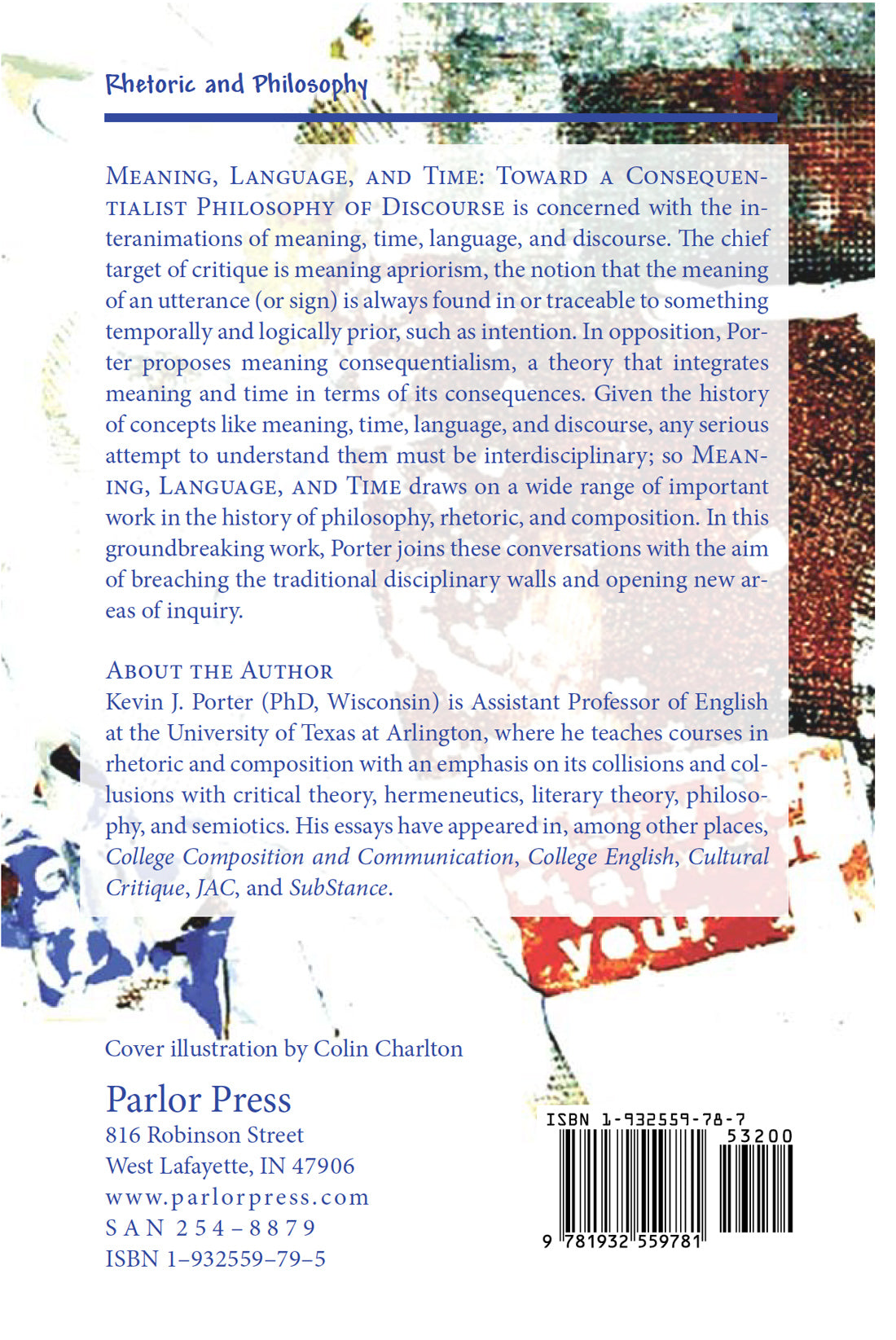Description
Kevin J. Porter
Winner of the 2006 W. Ross Winterowd / JAC Award for Best Book in Composition Theory.
Information and Pricing
978-1-932559-78-1 (paperback, $32.00); 978-1-932559-79-8 (hardcover, $65.00); 978-1-932559-80-4 (PDF, $19.99); 978-1-60235-933-8 (EPUB, $19.99) © 2006 by Parlor Press, 424 pages, with notes, bibliography, and index.
Bookstores: Order by fax, mail, or phone. See our "Sales and Ordering Page" for details.
About This Book
Meaning, Language, and Time: Toward a Consequentialist Philosophy of Discourse is concerned with the interanimations of meaning, time, language, and discourse. The chief target of critique is meaning apriorism, the notion that the meaning of an utterance (or sign) is always found in or traceable to something temporally and logically prior, such as intention. In opposition, Porter proposes meaning consequentialism, a theory that integrates meaning and time in terms of its consequences. Given the history of concepts like meaning, time, language, and discourse, any serious attempt to understand them must be interdisciplinary; so Meaning, Language, and Time draws on a wide range of important work in the history of philosophy, rhetoric, and composition. In this groundbreaking work, Porter joins these conversations with the aim of breaching the traditional disciplinary walls and opening new areas of inquiry.
What people are saying about Meaning, Language, and Time . . .
Even as it problematizes the very notion of a scholarly “field,” this book offers an important contribution to theoretical work done in and around rhetoric and composition. While the Meaning, Language, and Time organized around questions concerning the temporality of meaning, the exploration of these questions offers an itinerary through linguistics, philosophy, rhetoric and composition, pedagogy, physics, and a host of other “fields.” At the heart of this book is a powerful interdisciplinary spirit that seeks to interrogate the problem of meaning across an extraordinarily diverse terrain and to show, for instance, the imbrications of practical pedagogical questions and enormous lineages of philosophical, scientific, and religious speculation. Indeed, the book is relentless in seeking out and revealing a whole series of strategies through which scholarship across the arts and sciences remains firmly committed to a schema of what it calls “meaning aprioirism” – the belief that the meaning of an utterance somehow pre-exists the consequences of that utterance.
It is undoubtedly a significant contribution to theoretical work in rhetoric and composition, while also (and quite intentionally) expanding the scope of what it might mean to contribute to that arena.
—John Muckelbauer, University of South Carolina
About the Author
Kevin J. Porter (PhD, Wisconsin) is Assistant Professor of English at the University of Texas at Arlington, where he teaches courses in rhetoric and composition with an emphasis on its collisions and collusions with critical theory, hermeneutics, literary theory, philosophy, and semiotics. His essays have appeared in, among other places, College Composition and Communication,College English,Cultural Critique,JAC, and SubStance.
Contents
Table and Illustrations
Acknowledgments
1 The Neglected Question of Meaning
2 The Principle of Panchronism: Eternity, Mysticism, and Interpretation
3 Panchronism and Consequentialism: The Labor of Meaning and the End of Interpretation
4 The Principle of Simultaneity: Absolute Time and the Spatialization of Society, Language, and Mind
5 Simultaneity and Consequentialism: The Distensions and Discontinuities of Mind and Community
6 The Principle of Durativity: Duration, Evolution, Intertextuality, and the Problem of Surplus Meaning
7 Meaning and Time
8 Severity, Charity, and the Consequences of Student Writing: Toward a Consequentialist Pedagogy
9 (In)Conclusion: An Envoi
Appendix: Premises about Time, Discourse, and Mind
Notes
References
Index
About the Author


